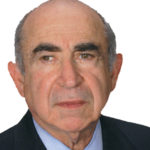2009 Honoree International DI Society’s W. Harold Petersen Lifetime Achievement Award. 2015 Honoree of NAILBA’s Mooers Award for Excellence.
From time to time we will feature an interview with Eugene Cohen, who has dedicated over 57 years of his life to learning, teaching, and supporting brokers in the agency’s quest to help consumers protect their incomes from the tragic effects of a disability. With the help of Victor Cohen, we will chronicle many of Eugene’s life lessons, advice, strategies, and what drives him every day to mentor those who wish to help their clients protect their incomes. Disability insurance is one of those products that can change the trajectory of an individual and a family’s life and is crucial for every financial planner and insurance professional to learn about and offer to clients.
This is the first part of our series with Eugene Cohen, CEO and founder of the Eugene Cohen Insurance Agency, Inc. The agency started as a disability insurance brokerage MGA and has grown to over 35 team members who are all focused on the wholesale service needs of financial professionals for disability, life, long term care and annuities.
Victor: Let’s start at the very beginning. How did you get started in the disability insurance business?
Eugene: Well, I had graduated from Ohio State University as a business major. I was newly married, looking for work.
I received an introduction from an employment agency to interview with an insurance company. They happened to specialize in offering disability income protection. At first, I was very concerned about working in this industry. I was 23 years old and I knew some people who used to sell insurance. They didn’t make it. That didn’t sound so uplifting. But after my interview at this insurance agency, I was really excited about the need for disability income protection.
Victor: Were you an immediate success?
Eugene: Like anything, it took time…but not too much time. You have to remember, after three months I was working on straight commission. And I had the greatest motivators in the world chasing me every day.
Victor: What’s that?
Eugene: I call it, “The mad dog of daily expenses.” Expenses! Rent, utilities, car payments, food, clothing…that “mad dog” was chasing me.
Victor: What else do you think led to your early success?
Eugene: Besides having a desire to succeed and natural competitiveness, I read many motivational books. And one thing they all had in common—they were all very positive.
When I started training at that first job–in a career shop—I noticed there were negative agents and there were positive agents. In high school I played football and also was a wrestler and I love sports. You’ll notice that there are spectators and the players on the field. The spectators get to judge, scream, play armchair quarterback and be negative. While the players were making it happen on the field. The players have to be motivated, focused, keep a positive attitude…they have to perform or be taken out of the game.
I knew I always wanted to be like the players on the field. Stay focused, stay motivated, keep a positive attitude—because what I was selling could change people’s lives! The game of life is a serious business and disability insurance can save individuals and families from the financial effects of a tragic disability.
I also found out very quickly that, like every business, the insurance business is a relationship business as well.
I also learned back when I started that the phone was one of the best ways to build relationships. Even in today’s world of email and instant messages, the most effective communication is by phone and now by video conferencing systems like Zoom.
Victor: Where did you get your leads?
Eugene: Back then I was using the yellow pages…can you imagine that? Now it’s easy. You have so many focused resources, such as Google, LinkedIn, lead services, etc.
Victor: Who did you focus on calling? Were there certain occupations you felt could use your services more than others?
Eugene: Everyone needs disability insurance, but the product seems to resonate more with certain occupations and income levels. I decided to work with professional people and business owners.
Victor: Why them?
Eugene: Doctors, dentists, attorneys, and all types of business owners…the need for disability income protection is so strong. That need is the same today as it was 57 years ago.
Victor: Did you have a prepared script you’d use when you’d cold call these prospects from the phone book?
Eugene: “Hello Mr. Jones, this is Eugene Cohen speaking. I’m a specialist in disability income protection, which is a policy to provide you with an income if you got sick or hurt and couldn’t work. Do you have anything like that?” That’s all I would say.
Most would say, “No, I don’t have anything like that,” in which case I would say, “I’d like to stop by and talk to you and explain the concept of disability income protection.” I was amazed because I was getting appointments!
In the rare situation when someone would say they already had a policy like that, then I would say, “When is the last time you have had the policy reviewed in comparison with your income? I’d like to stop over and introduce myself to you.” And I’d work on setting up an appointment.
People were willing to talk to me. I was on the phone every single minute.
Victor: What role do you think disability income protection plays in a person’s life?
Eugene: The way I look at disability income protection in my own mind is…this wonderful policy is like a silent partner that’s guarding a portion of my income. Could you imagine not having virus protection on a computer? It’s that silent partner, guarding the computer. Could you imagine driving without car insurance or having a home without homeowner’s insurance?
It really is very simple. If I couldn’t work due to a long and extended accident or sickness, I would need help paying my bills or risk wiping out my savings or at least taking a good chunk out of it.
Victor: So, even while becoming a top producer, there had to be times when a prospect didn’t end up buying the insurance. How did you handle that? The disappointment.
Eugene: As a new agent, when I didn’t make the sale, I would try to understand why and try to learn why someone wouldn’t buy. It’s all in the perspective you take and I learned that every time someone said “no,” it became a positive learning experience in that regard. And that’s when I discovered and started fully understanding the four objections that anyone who sells a product will hear at one time or another and how to overcome them. Those four objections are the same today as they were back then.
Victor: What are they?
Eugene: If someone does not proceed with purchasing a product or service, it’s usually due to one or more of four basic objections, regardless of whether the objection is real or just a delay. No Need. No Money. No Hurry. No Confidence. I believe these are universally true, regardless of the product or service you are presenting. It could be an insurance policy, a house, a business, even a TV or washer and dryer. It’s important for the person making the presentation to know how to address each objection in order to get to the root of the true issue and be able to adjust in order to move forward.
Victor: We’ll continue this conversation in our next interview. Thank you so much for sharing your experience, knowledge and love of this business.





























